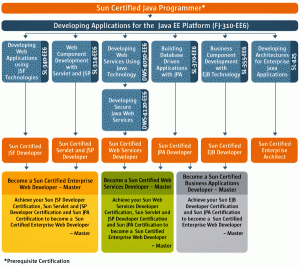I learned that Oracle is adding a course requirement to the developer and architect certifications. thanks to this CodeRanch thread. I’m glad I already completed the SCEA/OCMJEA. For facts and updates see the CodeRanch thread. The first post is being updated as we learn more about the details. This blog post is my thoughts on it along with a comparison to other certs.
What does Oracle hope to gain by the change?
The official statement/FAQ says,
Many Oracle certifications require hands-on course attendance as a part of the certification path. The course requirement is being added to these certification paths to bring them in line with Oracle Certification Program’s standards for the levels of certification under which they fall.
Oracle blogged about this for their Oracle exams. The gist of the blog is that less people take the test with a required course but it cuts out cheaters.
Other possibilities:
- It’s a way for Oracle to make more money. (Oracle denies this in the blog)
- It makes the certification rarer and more valuable. (This didn’t work out for Spring – see section below)
- It’s a way for Oracle to quietly retire those certifications from “lack of demand” or reinvent them into something else.
Things I find odd:
- They aren’t the right courses! For the architect exam, you can take Intro to Java, Intro to Modeling, JEE development or JEE architecture. I’ve paraphrased the names to make it easy to see that only one or two are things that apply to an architect. And all of them are something someone should know before taking the exam. I wouldn’t have been interested in going to any of those classes as I already know that material and it would have been a waste of time/money.
- Oracle doesn’t require a mandatory course for their developer exams.
- The Oracle 11g Master exam requires a two day hands on course to pass. I think this is what discourages cheaters, not the class. In our world, the equivalent would be a longer exam that has you develop or design something new in person. Incidentally, the SCJP Plus that Sun didn’t proceed with would have gone in that direction. (alebeit not at a master level)
- On the Oracle side, Oracle has declared that developer exams don’t go in the master category. The table shows they are all that professional or specialization/expert level. And no, most of them don’t require training. So I can be a Peoplesoft Expert without training but not a developer?
- An official course makes more sense for a product than development. (Oracle knows their database better than anyone.)
But Spring requires a course
The SpringSource developer exam (see my comments) has “required” completion of their course since the exam’s inception in 2008. Then they got rid of the grandfather option and everyone is required to take the course. Which of course means the exam serves as a final exam for the course and is of significantly less value. Not the best analogy.

